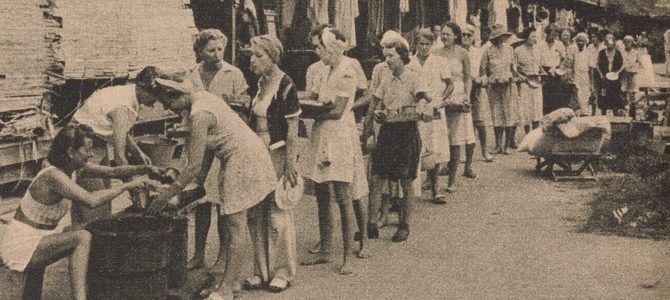
New voice from women’s internment camps, Singapore, 1943-1945
The Royal Commonwealth Society Library is extremely grateful to our colleagues at The Salvation Army Archives, Canada and Bermuda Territory, for helping to enrich our digital collection of Second World War civilian internment archives. They have shared images of a small collection of documents relating to the Canadian Salvation Army missionary Margaret Burns, who was working in Singapore at the time of the Japanese invasion of Malaya, and was interned following its capture in February 1942. The RCS has digitised its extensive records relating to the men’s civilian internment camps at Changi and Sime Road, Singapore. A volunteer, Tony Truett, is currently creating fully searchable transcriptions of one of their most important surviving sources, a series of camp newspapers. To view the transcriptions, please select the ‘View more options’ tab, and then select ‘transcription diplomatic’. Unfortunately, we hold little material relating to the women’s camps, and therefore we are fascinated by the light Margaret Burns sheds upon their experience.
The documents include a letter from King George VI to Burns expressing sympathy for the suffering she had endured as an internee and the report of a shower held to celebrate her evacuation to Canada at the end of the war. The most fascinating item, however, is a detailed memoir written by Burns in 1970, which begins with an account of the bombing and shelling before the fall of Singapore, and the fear and chaos which reigned in its immediate aftermath, when she and other missionaries helped to tend wounded Allied soldiers at the general hospital.
The bulk of the document narrates Burns’ three and a half year ordeal, describing the harsh living conditions, constant hunger and inadequate diet, which took such a heavy toll upon the physical and mental health of the internees. Her account of the psychological impact of internment, especially for mothers who had young children or who gave birth during internment, is particularly poignant. Alongside the suffering, however, Burns describes the determination and energy displayed by the internees in organising and running the camps themselves, and the leisure activities which played such an important role in maintaining their morale. Formal schooling was organised for the camps’ children. Burns’ Christian faith helped to sustain her and she describes the establishment of a Sunday School and regular services. Clergymen who came from the men’s camps to officiate passed on eagerly-awaited news from the outside world during the service, gleaned from secret home-made radios. Burns also graphically describes the camps’ often arbitrary and brutal disciplinary regime.
Burns spent much of her time in internment encased in a plaster cast after falling on the hospital steps and severely injuring her spine. She demonstrated considerable courage during the Double Tenth Incident of 10 Oct. 1943, when the Japanese searched the camps in the mistaken belief that intelligence provided by the internees had helped to instigate a raid upon Singapore Harbour. Before the search, internees who still possessed jewellery and money, and feared looting, hid them inside Burns’ plaster cast, ‘By this time so much weight had been lost… I could put my hands inside the loop-hole that had been cut in the centre so the doctor could see if the body was deteriorating… however we put some absorbent cotton over the opening and all was well.’ Following the liberation of the internees in Aug. 1945, Burns travelled by ship to Madras, where her cast was removed and she learnt to walk again, before returning to Canada via Britain in early 1946.
Burns’ memoir may be read in full along with the rest of our collection of civilian internment archives. Records relating to the women’s camps are held by the Imperial War Museums.

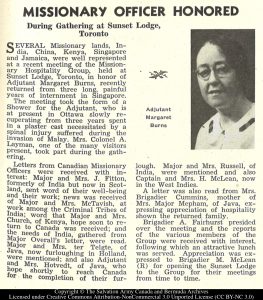
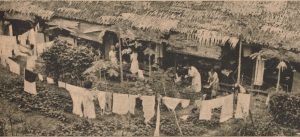
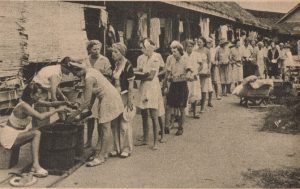
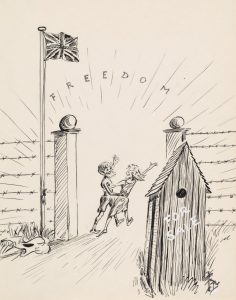
Margaret Burns is my Grand Aunt, my grandmother’s sister on my mother’s side.
She taught me Sunday School in Montreal about 63 years ago.
She was a hero.
I know there was a small paperback book about her that I would love to locate.
I am in the process of writing a poem about her.
Peace to All❤️